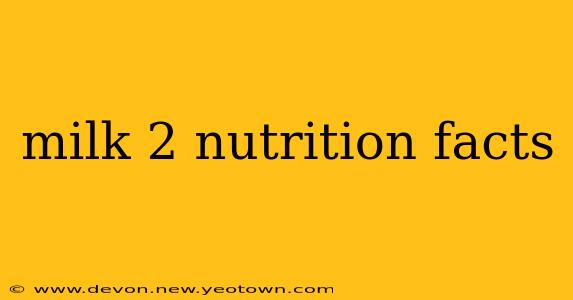Milk. The simple word conjures images of childhood, creamy lattes, and the comforting warmth of a mug on a cold day. But beyond the nostalgic associations, milk is a nutritional powerhouse, offering a surprisingly diverse range of benefits. This deep dive into milk's nutritional facts will explore why it remains a staple in so many diets across the globe. Let's embark on a journey to unravel the secrets of this humble yet remarkable beverage.
What are the main nutritional components of milk?
Milk's nutritional profile is remarkably comprehensive. At its core, it’s a rich source of calcium, crucial for strong bones and teeth. But it doesn't stop there. Milk also provides significant amounts of protein, vital for muscle building and repair. This protein isn't just any protein; it's a complete protein, meaning it contains all nine essential amino acids our bodies can't produce on their own. Beyond protein and calcium, milk is a good source of vitamin D, essential for calcium absorption and overall bone health. It also boasts riboflavin (vitamin B2), crucial for energy metabolism, and potassium, an important electrolyte for maintaining fluid balance. The exact nutritional content will vary depending on the type of milk (whole, skim, 2%, etc.), but the core benefits remain consistent.
Is milk good for weight loss?
This is a question that often sparks debate. The answer isn't a simple yes or no. While whole milk is higher in fat and calories, skim milk or low-fat milk can be incorporated into a weight-loss diet. The protein in milk promotes satiety, meaning it helps you feel fuller for longer, potentially reducing overall calorie intake. However, it's crucial to remember that milk, like any food, should be consumed in moderation as part of a balanced diet and exercise plan. Overconsumption, even of low-fat milk, can contribute to weight gain.
What are the health benefits of drinking milk?
The health benefits of milk extend far beyond simply building strong bones. The combination of nutrients contributes to a variety of positive health outcomes:
-
Stronger Bones and Teeth: The high calcium and vitamin D content are essential for bone health, reducing the risk of osteoporosis and fractures, especially important as we age.
-
Improved Muscle Function: The protein in milk aids in muscle growth and repair, crucial for athletes and anyone looking to maintain muscle mass.
-
Boosted Immunity: Milk contains various nutrients that support the immune system, helping the body fight off infections.
-
Reduced Risk of Certain Diseases: Some studies suggest a link between milk consumption and a reduced risk of certain chronic diseases, although more research is ongoing.
Is milk suitable for people with lactose intolerance?
Lactose intolerance is a common condition where the body struggles to digest lactose, the sugar in milk. For those with lactose intolerance, traditional cow's milk can cause digestive discomfort. However, thankfully, there are several alternatives:
-
Lactose-free milk: This milk undergoes a process that breaks down lactose, making it easier to digest.
-
Plant-based milks: Almond milk, soy milk, oat milk, and others provide a range of alternatives, each with its unique nutritional profile. It's important to check the labels to understand the nutritional content as these alternatives may not contain the same levels of calcium, vitamin D, and protein as cow's milk.
Choosing the right milk alternative depends on individual dietary needs and preferences.
How much milk should I drink per day?
The recommended amount of milk consumption varies depending on age, activity level, and overall health. Dietary guidelines often suggest specific daily intakes, but consulting a healthcare professional or registered dietitian is always advisable to determine the best amount for your individual circumstances. They can take your unique health situation into account and advise accordingly.
Milk remains a valuable part of a balanced diet for many, offering a wealth of nutritional benefits. However, remember to make informed choices based on your individual needs and preferences, considering alternatives if necessary. From supporting bone health to aiding muscle growth, milk's contribution to overall well-being is undeniable.

